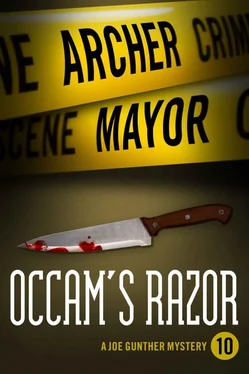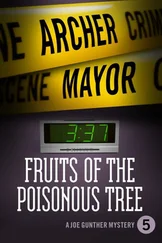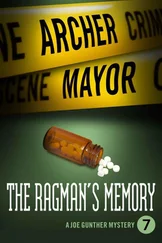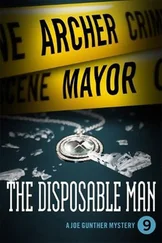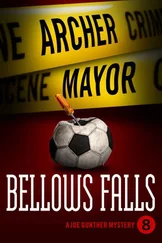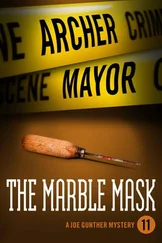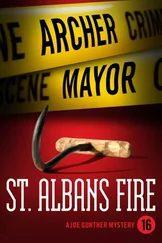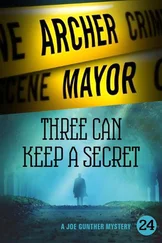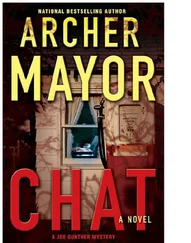Archer Mayor - Occam's razor
Здесь есть возможность читать онлайн «Archer Mayor - Occam's razor» весь текст электронной книги совершенно бесплатно (целиком полную версию без сокращений). В некоторых случаях можно слушать аудио, скачать через торрент в формате fb2 и присутствует краткое содержание. Год выпуска: 1999, ISBN: 1999, Издательство: MarchMedia, Жанр: Полицейский детектив, на английском языке. Описание произведения, (предисловие) а так же отзывы посетителей доступны на портале библиотеки ЛибКат.
- Название:Occam's razor
- Автор:
- Издательство:MarchMedia
- Жанр:
- Год:1999
- ISBN:9781939767097
- Рейтинг книги:3 / 5. Голосов: 1
-
Избранное:Добавить в избранное
- Отзывы:
-
Ваша оценка:
- 60
- 1
- 2
- 3
- 4
- 5
Occam's razor: краткое содержание, описание и аннотация
Предлагаем к чтению аннотацию, описание, краткое содержание или предисловие (зависит от того, что написал сам автор книги «Occam's razor»). Если вы не нашли необходимую информацию о книге — напишите в комментариях, мы постараемся отыскать её.
Occam's razor — читать онлайн бесплатно полную книгу (весь текст) целиком
Ниже представлен текст книги, разбитый по страницам. Система сохранения места последней прочитанной страницы, позволяет с удобством читать онлайн бесплатно книгу «Occam's razor», без необходимости каждый раз заново искать на чём Вы остановились. Поставьте закладку, и сможете в любой момент перейти на страницу, на которой закончили чтение.
Интервал:
Закладка:
And which had stimulated this trip.
According to our research, Marcia Wilkin had not only known both Danny and Mark Mullen as young men, but-we strongly suspected-maintained powerful and secret ties to them to this day.
Unfortunately, that still didn’t give us much. Danny Mullen, in jail awaiting trial for murder, hadn’t said a word since the day he’d been cuffed. It was only wishful thinking on my part, therefore, that Marcia Wilkin had the answers Danny was refusing to divulge. But by now-weeks of interviews, computer searches, and brainstorms later-it was all I had left to go on.
It had been a generally riotous fall. The September primary hadn’t followed anyone’s forecast. Most people I knew had entered the polls confident Mark Mullen would carry the day-despite all the bad publicity-only to discover the next morning that Jim Reynolds had won. Saint Sebastian, riddled with the arrows of his opponent’s devious ways, had pulled off his message of principle over politics.
But whether convinced that Reynolds was no paragon of either purity or innocence-a suspicion I shared-or merely yielding to his own thwarted ambition, Mark Mullen had thrown over the applecart of convention, declared himself an independent candidate, and stormed undeterred toward the November general elections, to the outrage and consternation of his party.
The chaos attending this move had revived national interest. Once again, articles, news reports, and TV shows were featured daily about the man-who-would-be-governor-come hell or high water-and whose brother was suspected of murdering on his behalf, turning the whole political contest into a carnival.
Little did we all realize that we were only two-thirds into a three-act play. With the same quirkiness that had once stimulated the state’s voters to elect a Democrat, a Republican, and an ex-Socialist each to Congress, they once again befuddled the pundits by splitting the vote four ways in November. The Republican, given no real chance to begin, limped across the line in third place, just ahead of a Liberty Union candidate, who, by miraculously winning fifteen percent of a disgusted electorate, further inhibited either Reynolds or Mullen from capturing a majority, although Reynolds did end up with the higher popular count.
But the rules were clear. According to the state’s constitution, a winner had to collect more than fifty percent of the vote. Shy of that, a legislative joint assembly got to choose from between the two top candidates. Mullen and Reynolds were to face off one last time in early January.
And convinced as I was that Mark Mullen had more than passively benefited from his brother’s scheming, I also had to admit that he’d survived so far not just because of the average Vermonter’s love of the absurd, but because, at long last, he’d stepped out from behind the machine of his own making and identified himself to the people as one of their own-born poor, proud, and willing to fight against the odds. As questionable as his integrity and his goals were, Mark Mullen on the stump came across as the genuine article, as homespun and honest as Reynolds appeared lofty, rich, and arrogant.
Not that I had any doubts that when it came time for the two men to lobby their erstwhile fellow legislators prior to the January vote, Mullen would come out on top. Not only was he a better back-room manipulator than Reynolds, but he’d just finished being the titular leader of one hundred and fifty House members. Reynolds had merely been one of thirty Senators, even if an important committee chair. It reminded me that while Saint Sebastian survived those arrows, his enemies had his head in the long run.
To pay him his due, I had liked Mark Mullen from the moment we’d met, and I suspected he actually hadn’t played any part in Resnick’s death. Most likely, his knowledge of Danny’s malfeasance was limited to financial chicanery, and Danny-stimulated either by frustration or who knew what quirk of allegiance-had stepped over the line on his own. Many a politician had sprung from a contaminated source. Who was I to say Mark Mullen might not similarly defy convention?
As I climbed the last gentle hill into Bristol, however, I knew it to be a fatuous debate, as easily argued from one side as from the other. The bottom line depended on what evidence I might or might not uncover, and on the vagaries of one hundred and eighty assembled legislators. Gut reactions and/or logic no longer had a place.
Marcia Wilkin’s home was a pleasant, well-maintained Cape with an immaculate yard and a new car in the driveway.
The first thing I heard upon ringing the bell was an urgent but feeble scratching on the other side of the door, followed by footsteps and a woman’s voice saying, “Watch out, Stan-door coming at you.”
I was met by a short, comfortably round woman, whom I knew to be in her forties, accompanied by a cat sitting by her feet like a statue.
“Hello,” she said. I held out my hand. “Hi. My name’s Joe Gunther. I’m from the-”
She lost her smile and ignored the hand. “I know who you are, Lieutenant. What do you want?”
“To come inside if I could. It would spare you some heating oil.”
She stepped back silently and I walked around the cat, who sniffed my leg as I passed. On impulse, I crouched and extended the backs of my fingers for him to sniff.
“He doesn’t like strangers,” she said.
The cat hesitated, came forward, and butted his head against my knuckles, purring loudly. I turned my hand and cupped his cheek, scratching him under the chin.
Marcia Wilkin relented slightly. “He doesn’t usually do that. Do you have a cat?”
“No, but I was raised on a farm. I like animals.” I brought my other hand into action, rubbing his back and really winning him over. “You called him Stan?”
“That’s right-Stan the Cat.”
I looked up at her. “The only other Stan I know is a newspaper editor. A real pain in the neck.”
She laughed despite herself. “So’s this one when he wants to be. You’ll find out if you keep doing that. He won’t leave you alone.”
“That doesn’t sound so bad,” I said, straightening up. Facing the front door, hanging on the wall, was a three-foot long, elaborately carved wooden sign reading, “The Ellis Hastings House.” Beneath it was a small table with an open Bible resting on a cushion.
I indicated the sign. “That’s nice work. It mean anything?” I waved a hand around me. “All this is too new to be historical, isn’t it?”
She gave me an odd smile. “Doesn’t have to be ancient to have history. I like a house with a name.”
“Hey,” I said, looking down. Stan had reared up to rest his forepaws against my leg, seeking more attention.
“I warned you.”
I bent over to ruffle his ears. He closed his eyes contentedly. “I’m sorry my showing up has made you unhappy, Ms. Wilkin.”
It might’ve been the cat acting as ambassador, but she finally relented. “I shouldn’t have been so rude. Let me take your coat.”
I shucked it off and handed it to her. She hung it on a peg on the way to the living room and gestured to me to sit in one of two facing sofas. The room was large, neat, and furnished-it looked to me-straight out of an expensive Ethan Allen catalog.
As soon as I sat down, Stan jumped into my lap, drilling his forehead amorously against my chest.
“If he starts bothering you, I’ll put him in the other room,” she offered, sitting opposite me.
“No, that’s fine. I enjoy the company.”
“That sounds a little lonely.”
I looked up at her. She was composed and serene in a matronly manner, but with careful, intelligent eyes. I was surprised by her insight and her ease in airing it-first impressions had slighted an obvious depth of character. “Sorry.”
Читать дальшеИнтервал:
Закладка:
Похожие книги на «Occam's razor»
Представляем Вашему вниманию похожие книги на «Occam's razor» списком для выбора. Мы отобрали схожую по названию и смыслу литературу в надежде предоставить читателям больше вариантов отыскать новые, интересные, ещё непрочитанные произведения.
Обсуждение, отзывы о книге «Occam's razor» и просто собственные мнения читателей. Оставьте ваши комментарии, напишите, что Вы думаете о произведении, его смысле или главных героях. Укажите что конкретно понравилось, а что нет, и почему Вы так считаете.
